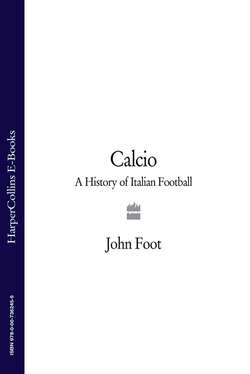Читать книгу Calcio: A History of Italian Football - John Foot - Страница 18
Revolution. Viareggio’s ‘red days’ of 1920
Оглавление‘Revolution, well before it is a “thing”, is an emotion’ – Avanti! (Socialist Party newspaper) comment on the ‘Viareggio days’, May 1920
Viareggio is a sleepy, elegant seaside town in Tuscany, famed for its long beaches, its February carnival, its liberty architecture and its bagni; institutionalized strips of beach where the rich and the semi-famous can bathe in relative privacy. The town has twice in its history had an impact on the history of calcio. In 1926, the new ‘fascist’ football federation constitution – known as the Viareggio Charter – was drawn up there and in the post-war period a celebrated young players’ tournament was organized (and still takes place) in the town. In 1920, however, at the height of the biennio rosso – Italy’s ‘two red years’ – a football match in Viareggio was enough to spark a kind of local revolution.
The story begins in Lucca, the beautiful walled city just inland of Viareggio, where the local team took the field against Sporting Club Viareggio in April 1920. According to reports, the away fans were greeted with ‘hostility and violence’. They vowed to get their revenge in the return match, planned for May. Worried about possible trouble, the authorities and the club advised all Lucca fans to stay at home. Only a tiny number made the trip to Viareggio. The referee was from Lucca, and he ‘failed to appear impartial’, according to press reports, during the game. As if to balance things up, a war hero called Augusto Morganti, from Viareggio, ran the line. Lucca came back from 2–0 down to draw level towards the end of the game, and this result was ‘blamed’ by the local fans on the referee. With the match drawing to a close, an argument erupted between the linesman and a Lucca player. The referee decided to end the game early, but Morganti was not of the same opinion. Both sets of players took the opportunity to settle some scores, laying into each other. This was the signal for a mass pitch invasion, and an ‘enormous fight’. The few carabinieri (military police) who were present managed to rescue the Lucca players from the hostile crowd, and pushed the Viareggio fans back outside into the street.
News reached the nearby carabinieri barracks, and more men were dispatched to the scene. They arrived to find the crowd attempting to re-enter the stadium, and were greeted with whistles and threats. At this point, the facts are unclear. One policeman, it appears, lost his head (he claimed he was threatened) and shot Morganti – the locally-born linesman – at close range in the neck, killing him immediately. This tragedy enraged the crowd, and the carabinieri were chased away. Meanwhile, Lucca’s players and their fans slipped out of a back door, and left town – they were forced to walk for twenty kilometres to the next station. In Viareggio the crowd turned its attention to more serious matters.
Arms were seized (including at least 100 rifles) and the railway lines blocked. The crowd surrounded the barracks and tried to get hold of the man who had shot the linesman. Barricades went up and telephone and electricity lines were cut. Viareggio was isolated, and in the hands of local subversives. Anarchists from local towns arrived on the scene: it felt and looked like a revolution. Three military columns were soon dispatched to quell the protests, some by sea. With some difficulty, and only after a couple of days, 200 soldiers took control. The taking of the town by local subversives entered into local mythology as Viareggio’s ‘red days’.
Football tried to draw a veil over the events of 1920. In 1921 a ‘Peace Match’ was organized in Viareggio and passed off without incident. However, in the 1921–22 season, violence was again on the agenda. Viareggio won the first derby, but the Lucca fans attributed their defeat to the intimidating atmosphere in the stadium which revived unhappy memories of 1920’s riots. The return match, in the claustrophobic city of Lucca, was extremely tense. Viareggio’s fans were escorted by the police, and after losing 2–0 they proceeded to smash up (according to the version provided by Lucca fans) anything they could find. Here politics, local rivalries (the Tuscan derbies, and in particular Pisa-Livorno, are perhaps the most emotional of all Italian derbies) and the social upheavals of the time, allied to protests against match officials, combined to produce an explosive situation.
